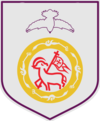Montagu Proctor-Beauchamp
Montagu Proctor-Beauchamp | |||||||||||||
|---|---|---|---|---|---|---|---|---|---|---|---|---|---|
 Montagu Proctor-Beauchamp in 1886 | |||||||||||||
| Born | Montagu Harry Proctor-Beauchamp 19 April 1860 | ||||||||||||
| Died | 26 October 1939 (aged 79) | ||||||||||||
| Burial place | St John's Cathedral, Langzhong | ||||||||||||
| Alma mater | |||||||||||||
| Occupation | Missionary | ||||||||||||
| Spouse | Florence Beauchamp (née Barclay) | ||||||||||||
| |||||||||||||
Sir Montagu Harry Proctor-Beauchamp, 7th Baronet (19 April 1860 – 26 October 1939)[1] was a British Anglican Christian missionary.
Biography[edit]

Proctor-Beauchamp was the fourth son of Sir Thomas William Brograve Proctor-Beauchamp, 4th Baronet, and his wife the Hon. Catherine Esther, daughter of Granville Waldegrave, 2nd Baron Radstock. He was educated at Repton and Trinity College, Cambridge.[1] Proctor-Beauchamp was one of the Cambridge Seven, students from Cambridge University, who in 1885 decided to become missionaries in China. He served with the China Inland Mission during the late Qing dynasty in western China (Sichuan, formerly spelt Szechwan). Together with Arthur T. Polhill-Turner and William Cassels, the three established a proper Church of England diocese in Szechwan.[2] He was evacuated from China during the Boxer Rebellion in 1900, but was back in China again from 1902 to 1911.[3]
On returning to England Beauchamp was ordained, becoming Vicar of Monkton Combe, Somerset between 1914 and 1918.[4] He was Principal Chaplain of the Mediterranean Expeditionary Force in World War I, serving in Egypt and Greece, and he was mentioned in dispatches in 1916.[4] He was senior chaplain Chaplain to the Forces of the North Russian Expeditionary Force in Murmansk in northern Russia in 1919, and appointed Honorary Chaplain to the Forces in 1921.[4]
Proctor-Beauchamp married Florence, daughter of Robert Barclay, in 1892. They had several children. He succeeded in the Proctor-Beauchamp baronetcy in 1915 when his elder brother Horace was killed in the First World War. He died in Langzhong in October 1939, aged 79, buried in the cemetery of St John's Cathedral, Langzhong.[5][6][7] He was succeeded in his title by his third but eldest surviving son, Ivor. Lady Proctor-Beauchamp died in May 1955.
See also[edit]
Notes[edit]
- ^ a b "Beauchamp [Proctor-Beauchamp], Montagu Harry [Proctor] (BCM879MH)". A Cambridge Alumni Database. University of Cambridge.
- ^ Austin, Alvyn (1996). "Missions Dream Team". Christian History. Worcester, PA: Christian History Institute. Retrieved 28 May 2021.
- ^ John Pollock. The Cambridge Seven. IVP 1955
- ^ a b c Alumni Cantabrigienses, John Venn, Cambridge University Press, 2011
- ^ Gibb, Michael (2021). "A Look Back in Time" (PDF). In Touch. Hong Kong: St John's Cathedral, Hong Kong. p. 9. Retrieved 1 May 2023.
- ^ "2014馬禮遜學園史蹟之旅--華西古道行,成都、閬中、重慶7日遊" [2014 Historical Sites Tour Organised by Morrison School: 7-day Tour of Ancient Roads in West China, Chengdu, Langzhong and Chongqing]. goodnews.org.tw (in Traditional Chinese). 2014. Retrieved 27 May 2021.
- ^ Wei, Wai-yang (2014). "閬中古城名醫多" [Famous Doctors in the City of Langzhong]. ccmm.org.tw (in Traditional Chinese). Retrieved 27 May 2021.
References[edit]
- Broomhall, Alfred (1985). Hudson Taylor and China's Open Century: Assault on the Nine. London: Hodder and Stoughton.

